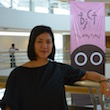Home » ricca ricca*festa Event Reports » Adjjima Na Patalung
Report: Asian TYA Network Programme @ricca ricca*festa 2018
This year I am pleased to have been invited again to take part in the Asian TYA Programme for the third time, especially after BICT Fest 2018 (17-27 May 2018), during which we also organised a SEA TYA Meeting, as a follow-on from the programme that was initiated and has been running at ricca ricca *festa since 2016.
If the objective of the programme is to understand the landscape of the theatre for young audiences situation in Southeast Asia, this edition of the programme, in my opinion, has come very far as to understand the core of the discourse of its existence in the current time. The journey since 2016 up to now consisted of a Asian TYA programme each year at ricca ricca *festa and 4 research trips: Singapore/Malaysia; Cambodia; Myanmar; and Thailand. After the trip to Myanmar a discussion was sparked off with a reflection on the nature of TYA activities in the majority of the Southeast Asian countries.
SEA region is richly diverse in many aspects; culturally and historically, and it is becoming more and more significant in the world economic landscape. Nevertheless, the majority of the countries still suffer from political instability, low level distribution of public education, human rights, and the drastic division between the rich and the poor. We found that theatre is an art form that has been used not only to heal but to serve the society’s needs for change along side artistic expression. However, throughout the years of its running, we found that most of the members in the growing network of the Asian Networking Programme are working in the area of applied theatre or theatre for social change and those focusing in the artistic creation produce works for young audiences along side works for adults. There are scarcely any SEA theatre makers solely committed to creating works for young audiences. This situation is not problematic but just presents itself as the matter of fact, which reflects the concerns and the priority of TYA activities in the region. The question was raised however, if the artistic standard can also be developed along side, as very often, the work for community is more focused on empowering and educating young people through the theatre process and methods, rather than on developing a highly artistic creation with and for them.
It was therefore important and relevant this year that ricca ricca *festa hosted the Asian TYA Networking programme with a focus on the subject of “Theatre for Social Change”. The selection of the SEA participants taking part this year was particularly geared towards practitioners with a strong professional focus in this area of TYA or working in applied theatre to talk about their practices, share their practices in a form of workshop led by Ruth Pongstaphone, a theatre maker/ educator, with years of experience in working in this field, and to then end with a discussion and exchange about the future of TYA, which was open for other interested individual outside of the programme to take part.
The 10 day programme was very rich and created a strong bond between the network, this year from SEA we welcomed new participants from Cambodia, Indonesia, Myanmar, the Philippines, Singapore, Thailand, and Vietnam. What I found very positive was the inclusion of TYA practitioners from other region, Japan, China, and UK. It is productive to involve TYA from other regions to take part in the programme, as they have brought in different perspectives into the exchange. TYA in East Asia and in Europe is developed in the artistic and commercial aspects. However, there is a common ground that in no matter which region, the TYA work is rooted in the intention to make a positive change in the society, in which it operates and serves, and that it is much more than just about artistic creation, and that extra cares are taken as it involves children.
However, as the programme is making its progress each year, the discussion more focused, specific and intense, I believe that in the future programme, we need more time to plan the structure of the contents and also more time during each discussion session, and that we might need involvement from other experts or researchers in fields such as anthropology, and sociology to take part in order to push the discussion further beyond each sharing to be just from personal experiences and point of views. I believe that this can create a rounded materials with strong contents. With uncertainty of future funding for the Asian TYA programme at ricca ricca *festa, we have started a discussion about how the programme can continue and grow, and how we can also move the programme around in other countries in SEA. This is a work in progress.
Lastly I would like to thank ricca ricca *festa for having been such fantastic and efficient spear head of the programme since the very start congratulate the festival for another year of successful programme all round. I would like to thank the Japan Foundation Asia Centre and ACO Okinawa for support for the Asian TYA programme and the development of the work in this region.



